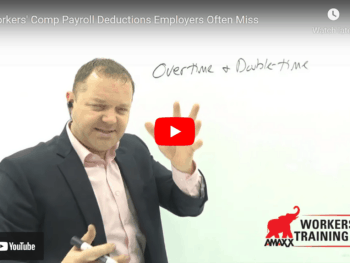How Would You Decide: Ohio Worker’s Arrival at Work Site More than One and One-Half Hours Early Might Nix His Comp Claim for Injuries Arising From Assault
Here’s What Happened
Buck was employed by Melco as a heavy equipment machine operator. He was assigned to do excavation at a quarry located approximately seventy miles from his home in Toledo, Ohio. He customarily left his home early to ensure that he arrived to the site on time for his work shift which began at 7:00 a.m. each workday.
However, it was customary for the employees to enter to the quarry at 6:30 a.m., when the foreman arrived, to start the machines, and to be ready to perform promptly at 7:00 a.m. On the day in question, Buck arrived at 5:30 a.m., parking his truck near the gate where he and others had been instructed. Between 5:45 a.m. and 6:00 a.m., he exited the vehicle to use a “port-a-john” located adjacent to the designated parking area. As Buck left the port-a-john to return to his vehicle, he was accosted by three men who beat and robbed him. Some ten minutes after the assault, other employees arrived and offered assistance. The foreman arrived at approximately 6:30 a.m. and law enforcement officers were notified.
Buck was admitted to a county hospital for treatment of his injuries and subsequently sought workers’ compensation benefits. Both the district hearing officer and the staff hearing officer for the Industrial Commission allowed the claim, concluding that the injury occurred in the course of and arose out of Buck’s employment. Melco appealed to the Industrial Commission, which refused to consider further appeal. Melco then appealed to the County Court of Common Pleas pursuant to Ohio Rev. Code Ann. § 4123.512. The parties entered a stipulation of facts and indicated the only issue on appeal before the trial court was whether Buck’s injury occurred within the course of and arising out of his employment with Melco.
The trial court granted Buck’s motion for summary judgment, finding that the injury was compensable and it denied Melco’s similar motion. Melco appealed, contending in relevant part that at the time of the assault Buck was not engaged in an activity required by his employment, that Buck’s actions did not serve any benefit to Melco because the injury occurred more than an hour prior to the scheduled commencement of Buck’s workday.
Here’s What The Court Decided:
In Buck v. Melco, Inc., 2009 Ohio 6872, 2009 Ohio App. LEXIS 5766 (Dec. 28, 2009), the Court of Appeal of Ohio (Third Appellate Dist.) reversed the entry of summary judgment, finding that there were a number of genuine issues of material fact that remained unanswered in the record. The court indicated Buck’s early arrival might have placed him outside the course of his employment with Melco. The appellate court stressed that while the parties had stipulated that it was “customary” for the employees to arrive at least thirty minutes prior to their shift, it was unclear whether some employees were “encouraged” or “expected” by Melco to arrive early and perform preparatory activities, or whether the practice of early arrival was purely voluntary for the convenience or benefit of the employees, as opposed to the convenience or benefit of Melco. The court added that Buck’s “customary” early arrival at the jobsite, standing alone, was an insufficient basis for a determination, as a matter of law, that Buck was “within the course of” his employment at the time of the assault.
According to the court, a more complete resolution of the factual circumstances surrounding the employees’ early arrivals was essential in determining whether the timing of Buck’s arrival at the jobsite was consistent with his contract for hire, logically related to his employment with Melco and, thus, whether Buck was indeed in the course of his employment when his injury occurred. The court also indicated that similarly, the issue of Buck’s early arrival to the jobsite also raised issues of material fact with regard to the “arising out of” portion of the court’s analysis. (workersxzcompxzkit)
On the one hand, ensuring that an employee arrived on time benefited the employer-having an employee readily available when the foreman arrived was important. On the other hand, a question naturally arose as to whether, under the totality of circumstances and employer expectations, an employee’s presence a full one and a half hours before the formal 7:00 a.m. start time still fell within the “benefit the employer received” language described in the important Ohio case, Lord v. Daugherty, 66 Ohio St. 2d 441, 423 N.E.2d 96 (1981). Based on the factual issues, summary judgment was not appropriate. See generally Larson’s Workers’ Compensation Law, § 8.01, 8.03, 12.01, 13.04.
Tom Robinson, J.D. is the primary upkeep writer for Larson’s Workers’ Compensation Law (LexisNexis) and Larson’s Workers’ Compensation, Desk Edition (LexisNexis). He is a contributing writer for California Compensation Cases (LexisNexis) and Benefits Review Board – Longshore Reporter(LexisNexis), and is a contributing author to New York Workers’ Compensation Handbook(LexisNexis). Robinson is an authority in the area of workers’ compensation and we are happy to have him as a Guest Contributor to Workers’ Comp Kit Blog. Tom can be reached at: compwriter@gmail.com
http://law.lexisnexis.com/practiceareas/Workers-Compensation
Podcast/Webcast: How To Prevent Fraudulent Workers’ Compensation Claims
http://www.workerscompkit.com/gallagher/podcast/Fraudulent_Workers_Compensation_Claims/index.php
TD Calculator: www.ReduceYourWorkersComp.com/transitional-duty-cost-calculator.php
WC Calculator: http://www.reduceyourworkerscomp.com/calculator.php
©2009 Amaxx Risk Solutions, Inc. All rights reserved under International Copyright Law. If you would like permission to reprint this material, contact Info@WorkersCompKit.com

























